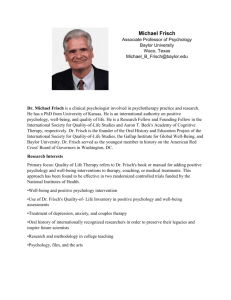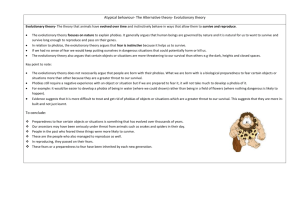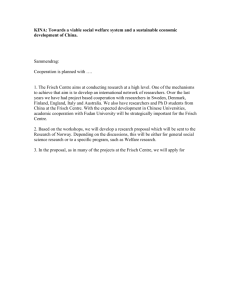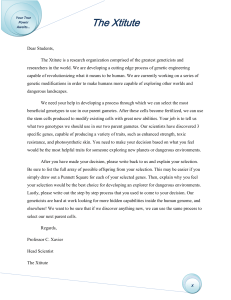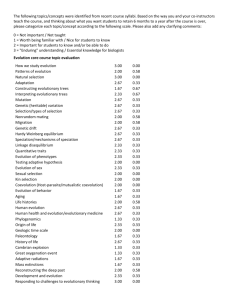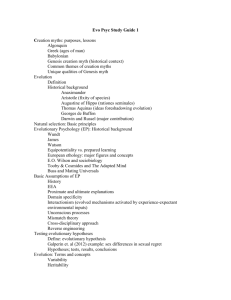Evolutionary Psychology: Proto Science or Pseudo Science?
advertisement
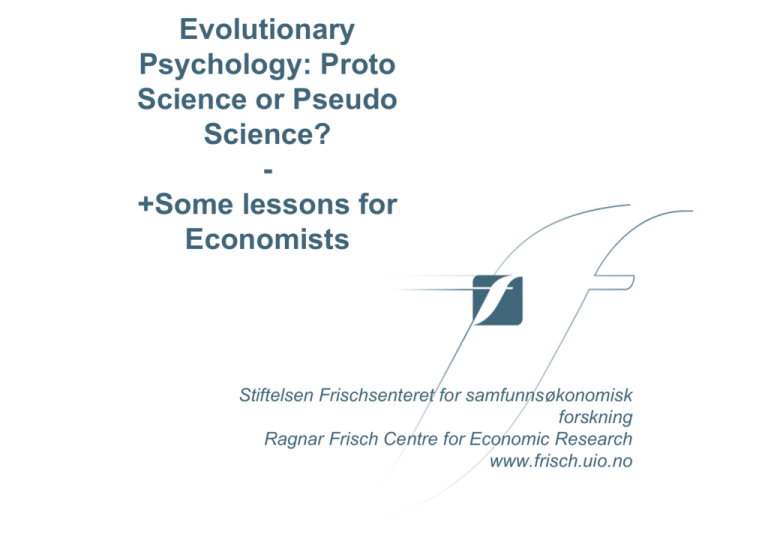
Evolutionary Psychology: Proto Science or Pseudo Science? +Some lessons for Economists Stiftelsen Frischsenteret for samfunnsøkonomisk forskning Ragnar Frisch Centre for Economic Research www.frisch.uio.no Background • There is a long history of using ”Natural” as a prefix to the term behaviour. • In science there has been several attempts to infuse ecological/evolutionary thinking into models of human behavior. Most of this is currently viewed as abhorrent. • Sociobiology was hot in the 70ies. Humans as ants who in an ideal world should work together for the common good. • Current fad is Evolutionary Psychology Frisch Centre Purpose of this presentation • Criticize the use of biological explanations of human behaviour – Show that many of the biological explanations simply makes no sense. – Argue (in a rather rough manner) that the methodological foundations are very thin Frisch Centre Does Biology Have a role to Play in the Study of Human Behavior? • YES! It is impossible to argue that human behavior is not transferred through inheritance mechanisms. • We are products of evolution as all other living organisms • Without biology it is impossible to explain variations in eg: – Intelligence – Sexuality/The structure of reproductive units such as marriage. Frisch Centre Biology as a Behavioral Science • Has many names. I shall use Evolutionary Psychology • The basic idea is that human behavior can be explained by evolutionary adaptations in the Darwinian sense to living conditions in man’s early history • I think this is a great idea and could result in exciting research. Frisch Centre But.... • Until these guys get their act together it is impossible to take them seriously. Frisch Centre Examples • • • • Phobias Suicide genes Rape genes And more… Frisch Centre What are we arguing about? • Nature vs Nurture is the traditional name. This term is too narrow. • What determines human behavior/personality? – Nurture: Interaction between individual upbringing/living conditions/experience and cognitive processes – Nature: Interaction between genetic selection and the living conditions of the ancestors. Frisch Centre Phobias • One of the triumphs of evolutionary psychology. • To quota a famous practitioner: We have phobias for things that were dangerous in the past. We are not sufficiently scared of things that are dangerous today. We are hypophobic • Dangerous in the past: – Heights – Dark, enclosed spaces – Water – Spiders – Animals (mice, dogs, birds) •Dangerous now: •Cars •Guns •Pills, •Intoxicants, •Gambling • Unsafe sex • sugars, salt and fat Frisch Centre Arachnophobia • To quote Steven Pinker. “Spiders and Snakes are often venomous, especially in Africa....Fear is the emotion that motivated our ancestors to cope with the dangers they were likely to face." • Those of our ancestors who panic or are disgusted in the presence of spiders have a higher rate of reproductive success. • Experiments have shown that small children find spiders scary. • Sounds perfectly reasonable. Frisch Centre BUT… • The only spiders that actually kill people live in Australia and America • There have never been any migration from these areas so these areas cannot be the source of anxiety inducing genes. • By the rules of evolution, such genes are therefore logically impossible. • Arachnophobia must be learned or a product of other cognitive processes! Frisch Centre Funny responses • Quote from Kennair: – There are poisonous spiders in relevant areas. (This is true, but irrelevant as they do not do significant damage to humans.) – Evolution of our anxiety responses is not determined by where spiders are today. It is enough that they were present in our evolutionary history. (This is a tricky theory to falsify.) • Classic psychological defense mechanisms. Denial and rationalisation Frisch Centre Phobias • We have phobias for things that were dangerous in the past. We are not sufficiently scared of things that are dangerous today. We are hypophobic. • Lets take another look at his list • Dangerous in the past: – Heights – Dark, enclosed spaces – Water – Spiders – Animals (mice, dogs, birds) •Dangerous now: •Cars •Guns •Pills, •Intoxicants, •Gambling • Unsafe sex • sugars, salt and fat Frisch Centre Some Interesting Phobias • • • • • • Fear of guns: Hoplophobia Fear of medicines: Pharmacophobia Fear of alcohol: Methyphobia Fear of fat in food: Lipophobia ”Fear of unsafe sex”: Aidsphobia Hard to think of anorexia (aka Cibophobia) as anything but fear of obesity These are all phobias of things that are dangerous today Frisch Centre More interesting phobias: • Fear of the number 13: Triskaidekaphobia • Fear of women: Gynophobia – Fear of beautiful women : Venustraphobia – Fear of sex: Genophobia • Fear of dentists and hospitals: Odontophobia og Nosocomephobia • Fear of no bars on your mobile: Nomophobia This list could have been a lot longer. The message is: There are many phobias that cannot in any conceivable way be or have been helpful in increasing your reproductive success. Frisch Centre My claims about evolutionary advantage of phobias • Although this idea is seemingly plausible it really is just nonsense. – It is striking how few of the phobias are concerned with things that are actually dangerous. Height, water spiders etc is not or have never been particularly dangerous compared with e.g. hippopotami, malaria mosquitoes and tse-tse flies. – It has always been much more dangerous to have a fear of height / water than not having it. You meet the really dangerous thing is it important to be rational and stay cool! • In economic language, phobias are constraints on behavior limiting the opportunity set. Such constraints rarely improve the objective function. Frisch Centre A phenomenon similar to phobias Fetishism • Ubiquitous • Lots of variation between individuals • Expressions of underlying psychological drives that definitely have evolutionary causes. • Here is mine. The Bunad: Frisch Centre The point about fetishism • Shares the mentioned features with phobias • Is probably evolutionary neutral except in extreme cases where they are negative from an adaptative perspective. • I am eagerly awaiting the first published study on how fetish for red rubber boots provided an evolutionary advantage to Pleistocene man Frisch Centre Rape genes • Randy Thornhill: ” rape is part of the male mental sexual psyche; was at least part of a successful male reproductive strategy in human evolutionary history” • So when males rape it is part of their nature. • Again something that sounds plausible. You rape someone, you spread your genes. Frisch Centre BUT… • What happens to the child? Will it be as well cared for as other children? • What happens to the mother? Will she be a good mother? Will she even survive? • What happens to the rapist? • Hardly an effective way of reproducing Frisch Centre What is rape? • Rape is a very complicated social phenomenon that occurs under different prerequisites in a variety of cultural contexts. Rape as a weapon in ethnic warfare probably has little to do with reproductive success. • We are genetically programmed to be sexually excited. This can manifest itself as abnormal behavior that may be spontanous and short lived in some males (mostly) and pathologic in a very few. • These bozos are dangerous when they say stuff like:”prevention efforts will founder until they are based on the understanding that rape evolved as a form of male reproductive behavior.” Frisch Centre Blue eyed M seeks Blue eyed F for procreation • If you are a male blue eyes with blues eyes and have a wife with blue eyes, then if the child has brown eyes you know you have been cheated upon. • This follows from Mendelian genetics. • Blue eyed males therefore prefer blue eyed mates so that they can have an increased probability of detecting infidelity and dump “illegitimate” children. • This is an unconscious process that is genetically programmed. Frisch Centre What does this actually mean? • Three requirements 1. Blue eyed males are genetically programmed to prefer blue eyed women. 2. Blue eyed males are genetically programmed with unconscious knowledge of Mendelian genetics, including the subtlety that green eyes are from a genetic standpoint “mostly blue.” Otherwise there is no gain from the first adaption. 3. Blue eyed females does not develop the counter strategy to only cheat with blue eyed males. • To me this is a bit of a stretch. Frisch Centre More nonsense: If there is no gene for racism, why are we all racists? • One of EP’s early problems. I quote: “Why are we so good at distinguishing between races when different races in the old times hardly met one another?” Cosmides and Tooby • Answer: We are good at identifying natural coalitions. • Alternative question: Why are we so good at distinguishing triangles from squares, propeller aircraft from jet planes, Labradors from German Shepherds? • Answer: We have eyes and ears and for most of us they work. We are damn good at putting things in categories. And this is no doubt the result of evolution. Frisch Centre More Nonsense • Men want pretty young women. • Women want males with material resources. • Again this is supposed to be genetic. Frisch Centre Hot Paleolithic Babes Frisch Centre What I believe is the truth • The ideal partner is both rich, resourceful and attractive. If an individual is deficient in one of these goods but has plenty of the other he/she will try to compensate by getting a partner that complements these deficiencies. • History is full of lusty powerful women who fornicated with young men. • History of science have a few good examples of young male scientists looking for wealthy widows Frisch Centre The only test – Find the Genes! • A reasonable requirement. If you believe that the behavior X is triggered by a gene Y, one would think that proper scientists would try to identify this gene. If you believe this, then to an evolutionary psychologist you are merely demonstrating your ignorance. Because: – If you want to find specific genes, you don’t understand genetics. They are talking about genetic programs don’t you know. – You don’t need to identify the genes. They have to be there. – Traditional ecology can get away with assuming behavior with genetic causation. So should EP. Frisch Centre So... • You don’t need to identify the causation. • The evolutionary advantage that is bestowed could occur at any point in our evolutionary history and is assumed to have existed • We should accept that the genetic determinants that drive behaviour in bacteria are the same that drive behaviour in humans with their over-developed frontal lobes. • What kind of $£§&% science is this?! Frisch Centre Is ”strange” behavior something that we should always assume is the optimal response to something? Frisch Centre Is it reasonable to assume that all observed behavior is the result of an optimal adaptation? • Is color blindness good for anything? It is definitely genetic. • Ambidextrousness? • Albinism? • A plethora of genetic diseases. • DNA is written in a very imprecise code. Lots of strange stuff can happen. Genetic drift is also important. – Side effects (Blue eyes and binge drinking) – Things that are diseases but does not harm reproductive ability enough to be selected against. Frisch Centre These guys are dangerous. • Rape gene an obvious example. • Suicide gene as well. Ideas from evolutionary psychology should not be used to treat depressives. • Exaggerate the importance of sexual differences and sexual specialization. When evolutionary psychologists claim that e.g. paternal leave is against nature they should not be listened to. • Claims about inherent violent nature are equally stupid. (Check the teeth) Frisch Centre Conclusions • There is an incredible amount of cultural variation. Humans have organized stable societies with completely different structures than Pleistocene man • Sexual roles and sexuality has varied and varies. Behaviorally I claim that a Norwegian male and female have a lot more in common than Norwegian males and males some other places. • The change in females societal position has led to resource rich females exhibiting traditional male behavior. ”Cougars” • Our behavior continuously adapts to changes in micro/macro-environments. Frisch Centre Can economists something to learn from this. • Clearly a tendency for ex-post rationalization of behavior through the construction of optimization models • Social scientists in general must be better at acknowledging that people to lots of strange stuff. It does not have to make sense. • Any policy advice built on the assumption that individuals will automatically understand complicated changes in regulatory regimes should be treated with suspicion Frisch Centre
